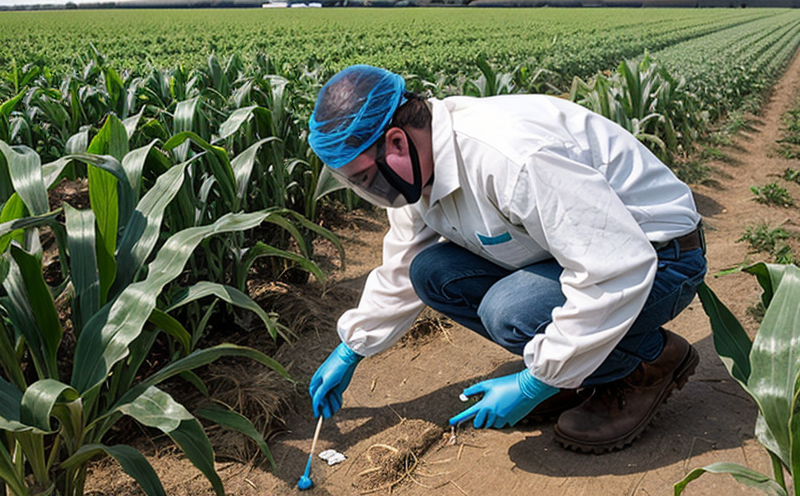Plant Growth Regulator Residue Testing (General)
The testing of plant growth regulators (PGRs) in crops is a critical component of ensuring food safety and quality. PGRs, also known as phytohormones, are synthetic or naturally occurring substances that influence the growth processes of plants. These include seed germination, fruit set, flowering, leaf expansion, root formation, and more. The presence of these residues in crops can have significant implications for human health, agricultural practices, and market standards.
Testing for PGR residues is essential to comply with international regulations such as those outlined by the World Health Organization (WHO) and the European Food Safety Authority (EFSA). In the United States, the Environmental Protection Agency (EPA) sets specific residue limits. The primary goal of these tests is to ensure that crops are free from harmful levels of PGRs, thereby protecting consumers from potential health risks.
Our laboratory utilizes advanced analytical techniques such as Liquid Chromatography-Mass Spectrometry (LC-MS/MS) and Gas Chromatography-Mass Spectrometry (GC-MS), which are highly sensitive and capable of detecting trace amounts of PGRs in various food products. This technology allows us to provide accurate, reliable results that meet the strictest international standards.
The process begins with thorough sample preparation, ensuring that all relevant parts of the crop are analyzed for residues. After extraction and purification, the samples undergo chromatographic separation followed by mass spectrometric analysis to identify and quantify PGRs. The results are then compared against established reference values provided by regulatory bodies such as ISO 13725:2016 and ASTM E2498-19 for pesticide residue testing.
The significance of this service extends beyond mere compliance; it also plays a crucial role in maintaining the integrity of agricultural supply chains. By identifying potential contamination early, stakeholders can take proactive measures to prevent issues from escalating into larger problems. This not only enhances market trust but also supports sustainable agricultural practices.
Benefits
The benefits of our plant growth regulator residue testing service are multifaceted and cater to various stakeholders within the agriculture and forestry sectors:
- Compliance with International Standards: Our rigorous testing ensures that your products meet stringent international standards, thereby facilitating smoother trade operations.
- Risk Mitigation: Early detection of PGR residues helps in minimizing potential risks to both consumers and producers. This proactive approach can prevent costly recalls and reputational damage.
- Informed Decision-Making: Reliable data enables stakeholders to make informed decisions regarding crop management, product development, and market positioning.
- Sustainability: By adhering to best practices in PGR usage, you contribute to the sustainable development of agriculture. This supports long-term environmental conservation efforts.
- Market Access: Meeting global standards opens up new markets for your products, enhancing business opportunities and growth potential.
In summary, our service provides a comprehensive solution that not only ensures regulatory compliance but also promotes responsible agricultural practices, thereby contributing to the overall well-being of consumers and the environment.
International Acceptance and Recognition
The importance of international acceptance in plant growth regulator residue testing cannot be overstated. Regulatory bodies worldwide have established guidelines that must be adhered to for agricultural products to gain market access. For instance, the EU's Maximum Residue Levels (MRLs) are strictly enforced through rigorous inspection processes.
Our laboratory is accredited by several leading accreditation bodies including ISO/IEC 17025:2017 and meets the requirements set forth in international standards such as ISO 9001. This accreditation ensures that our testing methods, personnel, facilities, and management systems comply with global best practices.
Our laboratory is also recognized by major food safety organizations like Codex Alimentarius Commission (CAC) and World Health Organization (WHO). Compliance with these standards not only enhances the credibility of your products but also fosters trust among consumers. By adhering to such stringent guidelines, we ensure that our clients can confidently export their produce to international markets.
Competitive Advantage and Market Impact
The ability to reliably detect plant growth regulator residues provides a competitive edge in the global agricultural market. Consumers are increasingly demanding transparency regarding the safety of their food products, making it essential for producers to demonstrate compliance with international standards.
Our comprehensive testing services offer several advantages that can significantly impact your business:
- Enhanced Consumer Confidence: By ensuring that your products meet the highest safety and quality standards, you build a strong reputation among consumers who value transparency.
- Premium Pricing Potential: Products certified as free from harmful residues can command premium prices in competitive markets. This translates to higher revenue and profitability for producers.
- Increased Export Opportunities: Meeting international standards opens doors to new export markets, expanding your customer base and increasing market share.
- Improved Brand Reputation: Demonstrating a commitment to safety and quality can elevate brand reputation, making it easier to attract and retain customers.
In addition to these benefits, our service also supports research and development efforts aimed at optimizing PGR usage while minimizing environmental impact. By providing accurate data, we assist in formulating best practices that benefit both the industry and society as a whole.





